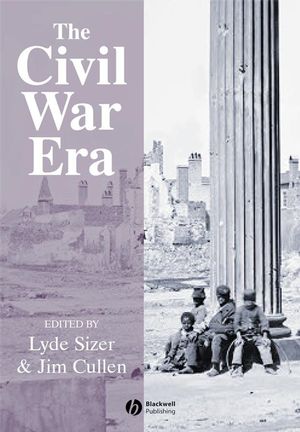The Civil War Era: An Anthology of SourcesISBN: 978-1-4051-0690-0
Hardcover
464 pages
January 2005, Wiley-Blackwell
 This is a Print-on-Demand title. It will be printed specifically to fill your order. Please allow an additional 10-15 days delivery time. The book is not returnable.
|
||||||
Introduction: The American Civil War in the Twenty-First Century.
A Civil War Chronology.
PART I: THE IMPENDING CRISIS.
Essays (with Headnotes and Questions):.
1 “A House Divided” by Bruce Catton (1960).
2 “The Divided South, Democracy’s Limitations, and the Causes of the Peculiarly North American Civil War” by William W. Freehling (1997).
Document Excerpts (with Headnotes and Questions):.
3 John Calhoun, speech on the Compromise of 1850.
4 Chapter 1, “In Which the Reader is Introduced to a Man of Humanity” from Uncle Tom’s Cabin by Harried Beecher Stowe (1851).
5 Louisa S. McCord, “Uncle Tom’s Cabin” (1853).
6 Escaped slave advertisements from The Key to Uncle Tom’s Cabin (1853).
PART II: JUSTIFYING THE WAR.
Essay (with Headnote and Questions):.
7 “The Spirit of ’61,” by George Fredrickson (1965).
Document Excerpts (with Headnotes and Questions):.
8 Alexander Stephens, “The Confederate Cornerstone” (1861).
9 Keziah Goodwyn Hopkins Brevard, Diary entry, (1860).
10 The North Carolina Standard, “Disunion for Existing Causes,” editorial, (1860).
11 Alexander Stephens, A Constitutional View of the Late War Between the States (1868).
III. THE BATTLE FRONT.
Essay (with Headnote and Questions):.
12 ‘Dangled Over Hell’: The Trauma of the Civil War,” by Eric T. Dean, Jr. (1997).
Document Excerpts (with Headnotes and Questions):.
13 Stephen Crane, The Red Badge of Courage (1895).
14 Wilbur Fisk, letter from the Peninsula Campaign, (1862).
15 “J.C.R.,” “The Battle of Fredricksburg,” Charleston Daily Courier (1863).
16 Sarah Rosetta Wakeman, a.k.a. Edwin R. Wakeman, Letter from the Red River (1864).
PART IV: THE HOME FRONT.
Essays (with Headnotes and Questions):.
17 Reid Mitchell, “The War at Home” (1990).
18 Jeanie Attie, “For the Boys in Blue: Organizing the U.S. Sanitary.
Commission” (1998).
Document Excerpts (with Headnotes and Questions):.
19 Gertrude Clanton Thomas, diary entry (1864).
20 Fannie Perry, letter to Norfleet Perry (1862).
21 Abraham Lincoln, letter to Lydia Bixby (1864).
PART V: WARTIME ECONOMIES.
Essay (with Headnote and Questions):.
22 Industrial Workers and the Costs of War” by Philip Paludan (1989?).
Document Excerpts (with Headnotes and Questions):.
23 Wilbur J. Cash, The Mind of the South (1941).
24 Mary Herrick, letter to Secretary of War William Stanton (1863).
25 Corporal John H.P. Payne, Massachusetts 55th regiment, letter (1864).
PART VI: SLAVERY DURING WARTIME.
Essays (with Headnotes and Questions):.
26 A Loss of Mastery,” by James L. Roark (1978).
27 “‘Answering Bells is Played Out’: Slavery and the Civil War” by Tera Hunter (1999).
Document Excerpts (with Headnotes and Questions):.
28 Mary Chestnut, diary entry (1861).
29 Sgt. George W. Hatton, letter from Wilson’s Landing, Virginia (1864).
PART VII: EMANCIPATION.
Essay (with Headnote and Questions):.
30 The Meaning of Freedom in the Age of Emancipation” by Eric Foner (1994).
Document Excerpts (with Headnotes and Questions):.
31 Lydia Maria Child, letter to Abraham Lincoln (1862).
32 Abraham Lincoln, letter to Horace Greeley (1862).
33 Abraham Lincoln, Emancipation Proclamation (1862).
34 Frederick Douglass, “Emancipation Proclaimed, Douglass’ Monthly (1862).
35 Abraham Lincoln, Address at Gettysburg, (1863).
36 Abraham Lincoln, Second Inaugural (1865).
VIII. RESISTANCE.
Essay (with Headnote and Questions):.
37 A Multiplicity of Grievances,” by Iver Bernstein.
Document Excerpts (with Headnotes and Questions):.
38 Abraham Lincoln, “Opinion on the Draft” (1863).
39 Adelaide Fowler, letter to Henry Fowler (1863).
IX. WAR ON THE FRONTIER.
Essay (with Headnote and Questions):.
40 The Way to Pea Ridge,” by Alvin Josephy, Jr.
Document Excerpts (with Headnotes and Questions):.
41 St. Paul Pioneer Press, account of Sioux executions (1862).
42 Mary Livermore, “Patriotic Iowa” (1888).
X. WARTIME POLITICS.
Essays (with Headnotes and Questions):.
43 The Confederate South at High Tide,” by Emory Thomas (1979).
44 “To Finish the Task: The Election of 1864,” by William Gienapp (2002).
Document Excerpts (with Headnotes and Questions):.
45 Nathaniel Hawthorne, “Chiefly About War Matters” (1862).
46 “Work,” the Boston Evening Transcipt (1864).
XI. GENDER BATTLES.
Essays (with Headnotes and Questions):.
47 What Shall We Do? Confederate Women Confront the Crisis,” by Drew Gilpin Faust (1999?).
48 “When God Made Me I Wasn’t Much, But I’s a Man Now,” by Jim Cullen (1992).
Document Excerpts (with Headnotes and Questions):.
49 Benjamin Butler, General Order #28 (1862).
50 Harriet Tubman, letter from Beaufort, South Carolina (1863).
51 Louisa May Alcott, “Chapter One: Obtaining Supplies,” from Hospital Sketches (1863).
XII. THE WRITTEN WAR.
Essay (with Headnote and Questions):.
52 Popular Literary Culture in Wartime,” by Alice Fahs (2001).
Document Excerpts (with Headnotes and Questions):.
53 Walt Whitman, “The Great Army of the Sick” (1863).
54 Walt Whitman, “A Sight in Camp in the Daybreak Gray and Dim” (1865?).
55 Julia Ward Howe, “Battle Hymn of the Republic” (1862).
56 Rebecca Harding Davis, “John Lamar” (1862).
XIII. VICTORY AND DEFEAT.
Essay (with Headnote and Questions):.
57 The Same Holy Cause,” by James McPherson (1997).
Document Excerpts (with Headnotes and Questions):.
58 Sarah Morgan Dawson, diary entry (1865).
59 Chaplain Garland H. White, letter from Richmond (1865).
XIV. RECONSTRUCTION.
Essay (with Headnote and Questions):.
60 ‘Privilege’ and ‘Protection’: Civil and Political Rights During Reconstruction,” by Laura F. Edwards (1997).
Document Excerpts (with Headnotes and Questions):.
61 Lydia Maria Child, letter to Sarah Shaw (1866).
62 Margaret Mitchell on the Freedmens’ Bureau, from Gone with the Wind (1936).
63 Thomas Dixon, “To the Reader,” from The Clansman (1904).
64 Emeline Brumfield, account of a Ku Klux Kan visit (date?).
XV. MEMORY.
Essay (with Headnote and Questions):.
65 Quarrel Forgotten or Revolution Remembered? Reunion and Race in the Memory of the Civil War, 1875-1913,” by David Blight (undated).
Document Excerpt (with Headnote and Questions):.
66 Frederick Douglass, “The United States Cannot Remain Half-Slave and Half-Free” (1883)



